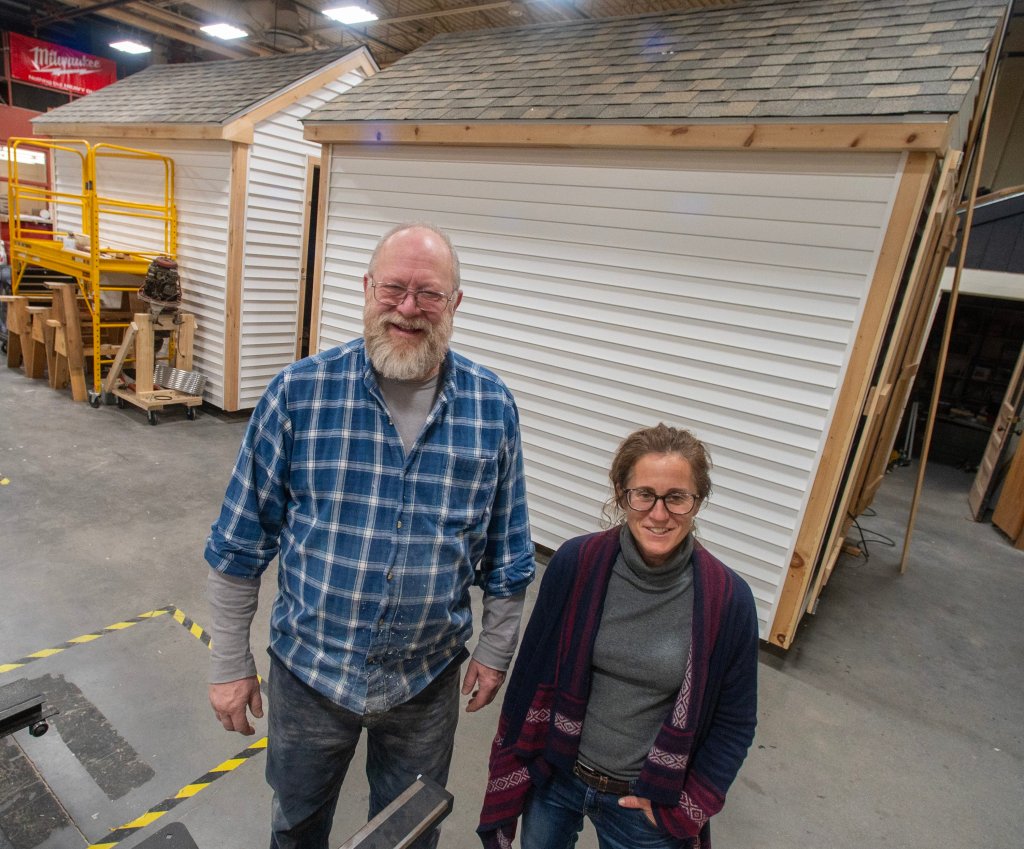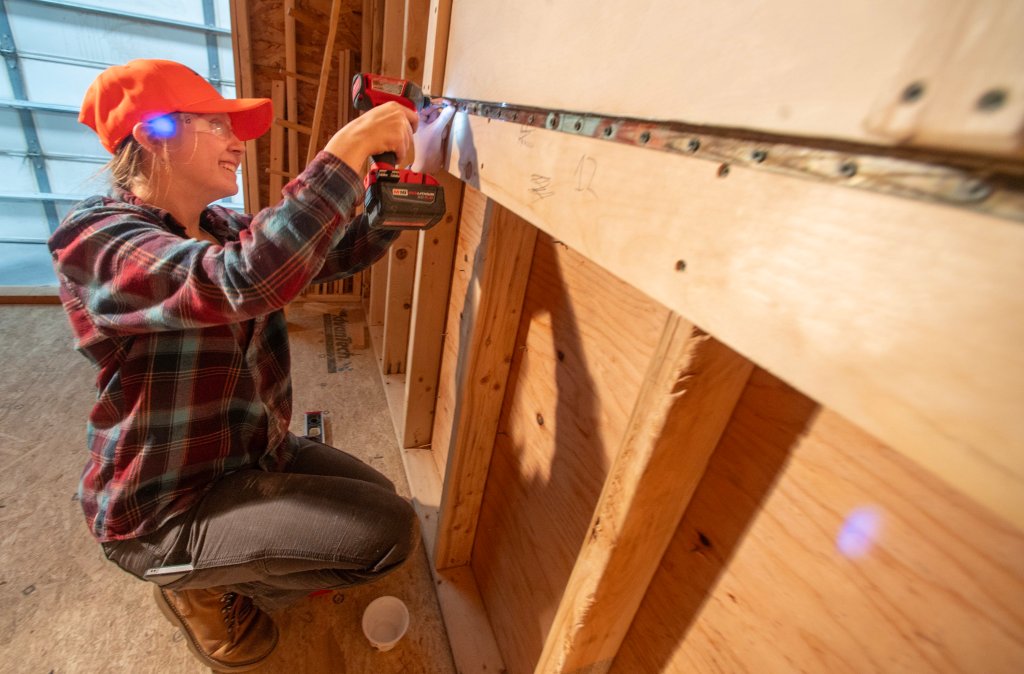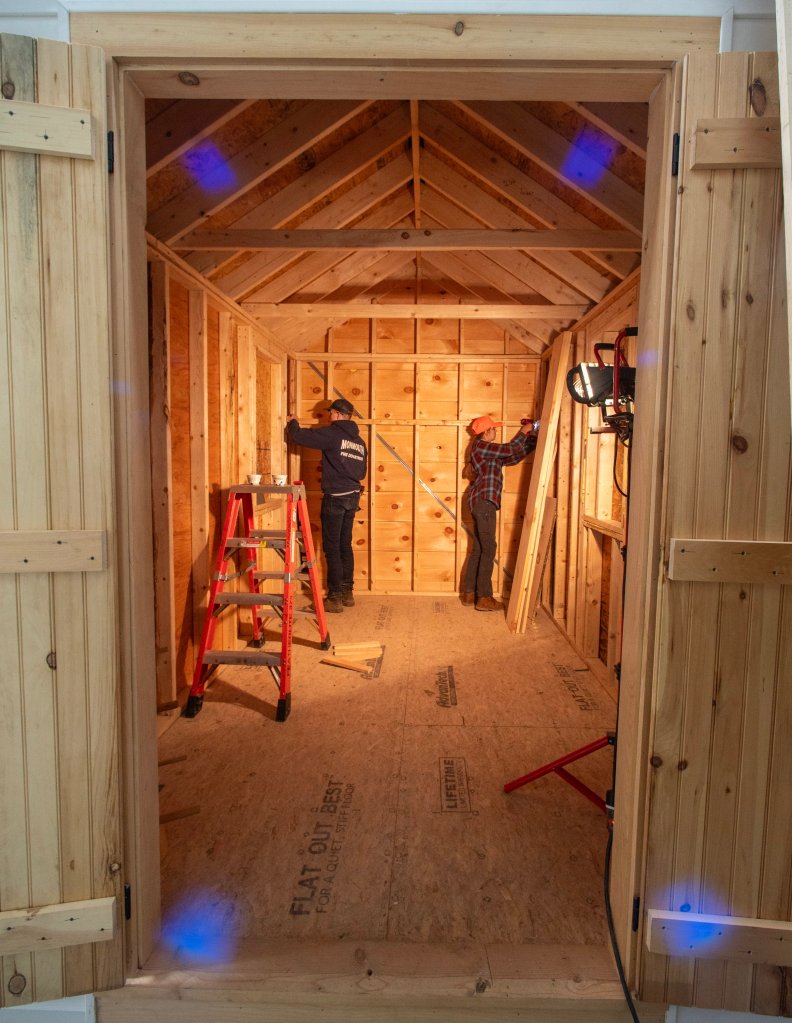AUGUSTA — As a new bicycle shop is set to open and a committee begins meeting in Maine’s capital city, two teachers in the Augusta School Department are encouraging more students to ride bikes.
Part of the push for increased bike ridership began with a $1,500 grant to buy bicycle helmets and parts. Brenda Weiss, a wellness teacher at Cony Middle and High School, received the grant from the Maine Environmental Education Association.
After a conversation with Tom Holzwarth, one of Weiss’ colleagues at the Capital Area Technical Center in Augusta, the project became a bicycle repair shed.
“We are trying to get kids on bikes, on the roads, on the trails and bring the love for bikes back into their lives,” Weiss said.
Weiss said unlike those in the past, today’s students are not as interested in riding bicycles to school. For the environment, student’s health and convenience, however, she is encouraging students to take up the practice.
Weiss is not the only person in central Maine urging increased bike ridership. City officials have begun meeting this month with the Augusta Bicyclist and Pedestrian Safety Committee, and a bicycle service and repair shop, Capital City Cycles, is scheduled to open Friday. Nash Callahan, one of Weiss’ former students, is opening the shop at 180 Water St.
Weiss incorporates bicycling into her outdoor education class, but few students seem compelled to ride after the segment on bike riding.
Weiss said her hope, with the bike shed and access to more bicycles, is Cony students will want to ride the trails behind the school and even begin riding a bicycle to school or work.
“The goal is to get the kids back on the road,” Weiss said. “I take them on trails behind Cony, and I have kids who I’ve taught how to ride a bike. It’s not too common (that they already ride a bike).”

Thomas Holzwarth, left, and Brenda Weiss stand outside two sheds last Tuesday at the Capital Area Technical Center in Augusta. Joe Phelan/Kennebec Journal
Holzwarth’s course on building and construction at the Capital Area Technical Center includes a section on building sheds. Holzwarth’s students had a shed they had begun building in March 2020 — early in the COVID-19 pandemic — but were never able to finish.
The students went to work and the finished product is a shed to house six or seven bicycles, complete with a repair station that Holzwarth said he will teach interested students to use.
Like the lack of interest in riding bicycles, Holzwarth said only a few students each year are interested in learning to repair them, which makes him jump at the opportunity to teach.
“Every year, we have one or two students that see my bike and I go: ‘You like bikes? Bring yours in and I’ll show you what to do,’ and I help them out with it,” Holzwarth said. “It’s so few, though. It’s unusual.”
BICYCLING MATTERS
With buses picking students up at their doorstep, why should students choose to ride bikes to school?
Dan Bassett, the education director at the Portland-based Bicycle Collation of Maine, said bikes are the “vehicle of the future” because they have no fossil fuel emissions.
Bassett said that in Maine, 75% of the trips people make in vehicles are less than 5 miles.
“The popularity of bikes has grown in areas with bike education and where people don’t need to drive long distances to get around,” Bassett said. “Bikes have definitely become more popular with the growth of e-bikes, which can be a great form of transportation.”
To Bassett’s point about bicycling gaining in popularity due to education and people’s traveling short distances, Massachusetts was ranked first in 2022 in the League of American Bicyclists’ Bicycle Friendly State ranking, with Maine coming in at 26. The ranking considers a variety of factors, including traffic patterns, infrastructure, traffic laws, policies and education about bicyling.
Weiss teaches bicycle safety in her outdoor education course and reminds students that when they drive a vehicle, they must be at least 3 feet from a bicyclist. The Augusta area has few bicycling lanes, and Weiss does not bring her students on the road as a safety measure.
Bassett said Weiss and Holzwarth are doing the right things to encourage more young people to ride bicycles.
“Sometimes it’s a ‘chicken and egg’ approach,” Bassett said. “Is it going to take someone to promote kids to ride bikes to get towns or schools more bike friendly, or vice versa, where towns or schools put infrastructure in place to get kids to ride bikes.”
Bassett said he also encourages bicycle swaps as a way for communities to get bikes into the hands of students.
Bicycle prices cover the spectrum, with some running $1,000 or more, which many families could not afford.
Weiss and Holzwarth’s program relies mostly on donations from local agencies or people in the community, and learning to repair bicycles can extend their life by many years and miles.
FUTURE OF BICYCLES
Like the pair of Cony teachers, grassroots programs and bicycle shops in central Maine are encouraging people in the Augusta area to ride bikes and the city to adapt measures to keep bicyclists safe.

Brayden Helmeth, left, a junior at Monmouth Academy, and Kate Swift, a junior at Erskine Academy in South China, install a drop down table last Tuesday in a bicycle repair shed at the Capital Area Technical Center in Augusta. Joe Phelan/Kennebec Journal
Kirsten Brewer is a member of the Augusta-based grassroots program CAPITAL, which promotes bicyclist safety and seeks improved infrastructure so bikes can be ridden safely in the city. She serves on the Augusta Bicyclist and Pedestrian Safety Committee, which was established last year and began meeting this month.
“I hope the group will be the consistent voice in communicating back to the (City Council) for folks on where to go if they are concerned about their street and their safety,” Brewer said. “We can provide tangible advice and set priorities, like with lots of roads in the city, how do you choose (what roads) and make investments to make the biggest change.”
Callahan, who is set to open Capital City Cycles on Friday, said he, like Brewer, attended the first meeting of the Bicyclist and Pedestrian Safety Committee, which made him feel hopeful the city is encouraging discussions on bicycling and how to adapt to those who ride bikes. And with his shop opening later this week, Callahan said the timing feels perfect.
After it opens, Capital City Cycles will be the only shop in the Augusta area for bicycle repairs. The closest bike shops are in Waterville or Lewiston, which makes for a difficult trek if a bike is a person’s main form of transportation, as is the case with Callahan. He said he already has people asking when they can get their bicycles repaired.
“I want to spread (my knowledge) to the community, and it’s something I’ve always talked about,” Callahan said. “When I used to sell someone a bike, it was like they were a kid again when they got their first bike. I want to spread the joy. Biking makes me happy. Driving doesn’t.”
Send questions/comments to the editors.










Success. Please wait for the page to reload. If the page does not reload within 5 seconds, please refresh the page.
Enter your email and password to access comments.
Hi, to comment on stories you must . This profile is in addition to your subscription and website login.
Already have a commenting profile? .
Invalid username/password.
Please check your email to confirm and complete your registration.
Only subscribers are eligible to post comments. Please subscribe or login first for digital access. Here’s why.
Use the form below to reset your password. When you've submitted your account email, we will send an email with a reset code.